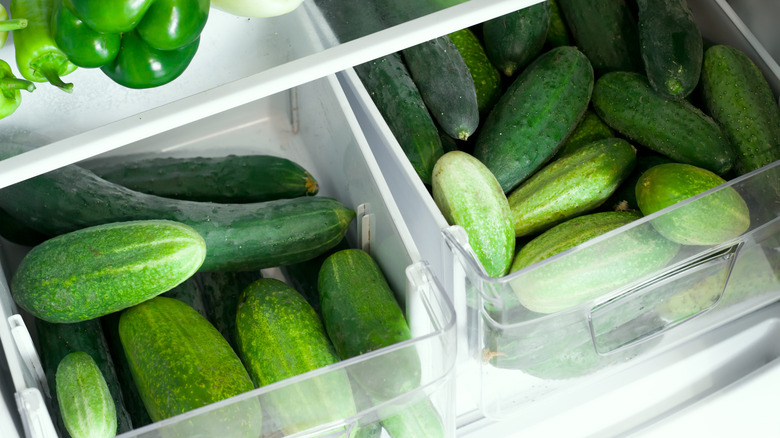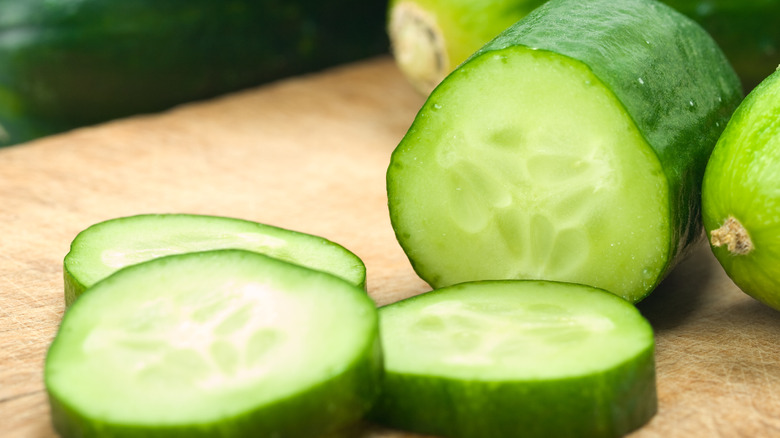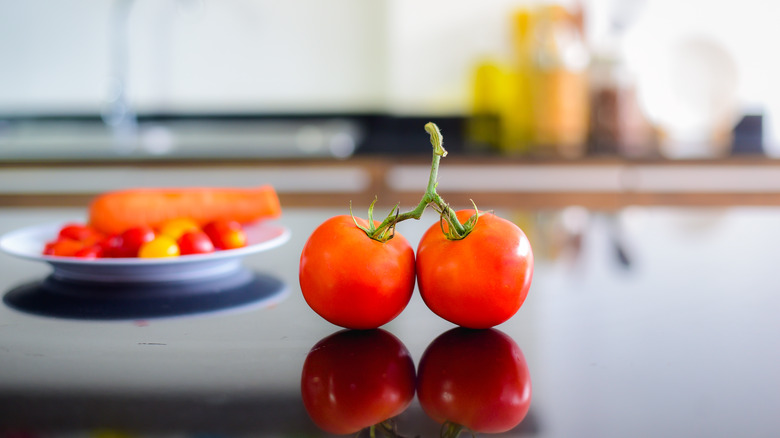Why The Fridge Isn't The Best Place To Store Cucumbers
Although many of us dutifully place our fruits and veggies in the fridge when we get home from the store, the appliance isn't actually the best spot for every piece of produce. A notable example are fresh cucumbers, regardless of variety.
While the average fridge temperature is 37 degrees Fahrenheit, cucumbers are happiest at slightly warmer temperatures, specifically in the range of 50-54 degrees Fahrenheit. Storing cucumbers in the fridge can result in them developing a condition called chilling injury, with symptoms like color bleaching, surface splits, and loss of water through their highly sensitive skins. In other words, your cucumber might develop unsightly white splotches or brown scarring, and become mushy to the touch.
To be clear, you can store cucumbers in the fridge for up to three days with minimal effects, but any longer exposure will cause the veggies to spoil quickly. Instead, consider placing them on the countertop (away from heat and direct sunlight) or in your basement. The one exception to this rule would be if you purchased grocery store cucumbers from a refrigerated section, as you'll then want to keep them refrigerated to keep the equilibrium.
Additional ways to keep cucumbers happy and fresh
Wherever you store cucumbers moving forward, there are a few additional steps you can take to get the most out of your veggies. For instance, keep them away from excess moisture, which can become trapped in airtight containers or plastic wrap. Rather, ensure the cucumbers are dry and contained in some kind of wrapping that allows airflow, such as paper towels. Any moisture released or collected will then be wicked away and able to freely evaporate.
Another food storage mistake to avoid is storing cucumbers near ethylene-producing fruits and veggies like bananas, apples, avocados, tomatoes, peppers, etc. as these can hasten the ripening and decaying of the sensitive produce. If possible, keep wrapped cucumbers on a separate counter to preserve their crispy texture for up to two weeks.
Once you chop one up, you can transfer it into an airtight container in the fridge, but you should still include paper towels inside the container to soak up any excess moisture. Keep in mind that once you cut into a cucumber, it loses the protection of its skin and will only last a few days thereafter before turning slimy and mushy.
What other fruits and veggies do better outside the fridge?
Most of us tend to go overboard with refrigerating our fresh produce, ultimately causing fruits and veggies to spoil more quickly than they would if they were kept at room temperature. Like cucumbers, stone fruits shouldn't be refrigerated due to their susceptibility to chilling injuries. The cold temperatures of the fridge can alter their flesh, making them mealy and unappetizing. Instead, keep them on the counter for the best results.
Potatoes also fare better in slightly warmer temperatures, and should ideally be stored in a cardboard box in a cupboard or basement. Similarly, you might want to reconsider storing onions in the fridge because they will absorb any moisture present, turning soft and mushy. If you have to prep onions ahead of time and store them in the fridge, be sure to use them quickly.
Last but not least, tomatoes should also be stored on the counter — at least while they're still ripening. Once fully ripe, you can move them to the fridge, but keep in mind that cooler temperatures can negatively affect their flavor and shorten their shelf-life.



